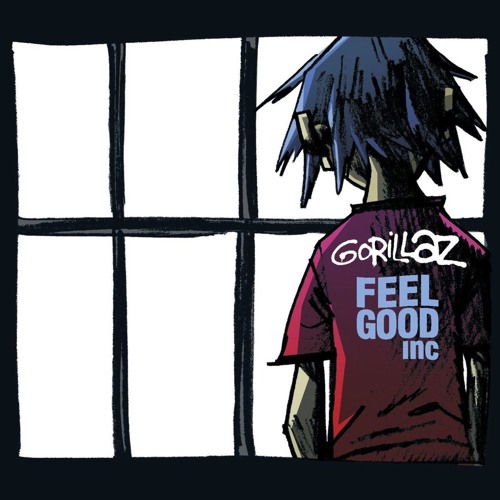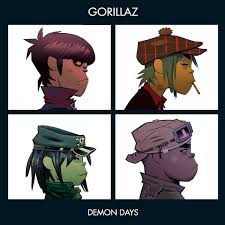Song Stories: Gorillaz: Feel Good Inc
In the spring of 2005, a wind turbine turned lazily in a dystopian dreamscape, and a cackling laugh cut through the haze. That was the moment Gorillaz reintroduced themselves to the world. ‘Feel Good Inc’, the lead single from their second album, ‘Demon Days’, didn’t just signal the band’s return; it launched them into a new stratosphere of global recognition. They would become one of the biggest and most recognisable bands in the world, and the song would become one of the most recognisable songs of the 2000s.
At once hypnotic, political, and infectiously catchy, the track became a defining anthem of the decade a cultural marker that demonstrated just how far Gorillaz had come since their genre-hopping debut. With its eerie mix of animation, social commentary, and sonic experimentation, it struck a chord with audiences around the globe and became the band’s most recognisable hit.
For Damon Albarn, ‘Feel Good Inc’ wasn’t just a hit it was a personal and artistic breakthrough. In the 1990s, Albarn had become a household name as the frontman of Blur, a band synonymous with the Britpop movement. Songs like ‘Parklife’ and ‘The Universal’ captured a certain Englishness with a blend of irony, character-driven storytelling, and melodic charm. Albarn had a knack for crafting hooks that felt both wistful and satirical, and that same instinct resurfaces in ‘Feel Good Inc’.
Listen closely to the verses, and you’ll hear something unmistakably Britpop lurking beneath the surface that acoustic, melancholic melody delivered in Albarn’s distinctively weary voice. It could almost be a Blur B-side in another life. There’s a reflective sadness in his delivery, a sort of resigned commentary on the state of things, that echoes the way he once sang about suburban mundanity.

But here, Albarn collides that Britpop sensibility with something entirely different: hip-hop. The track explodes into life when De La Soul burst in with their high-octane verses, wild, frenetic, full of laughter and menace. It’s an unexpected collision of styles, but that’s exactly what makes it work. The tension between Albarn’s introspective mood and De La Soul’s chaotic energy is what gives the song its bite. It's a fusion that, at the time, few mainstream acts were attempting and even fewer doing successfully.
This synthesis of Britpop melody and American hip-hop swagger was more than a stylistic gamble. It was a statement of intent. Gorillaz wasn’t going to be a side project or a novelty act; it was Albarn’s way of blowing up the boundaries between genres, between nations, between past and future. And ‘Feel Good Inc’ was the perfect introduction.
The success of ‘Feel Good Inc’ was immediate and global. It climbed to No. 2 in the UK and broke into the US Billboard Hot 100 a huge feat for a British band, let alone a virtual one. It won a Grammy for Best Pop Collaboration with Vocals and brought Gorillaz firmly into the mainstream.
But beyond the numbers, the track’s visual identity helped define its legacy. The music video, directed by Jamie Hewlett and Pete Candeland, features the band in a crumbling tower while Noodle escapes to a windmill-powered island floating through the sky. It’s a surreal contrast concrete decay versus open skies and perfectly matches the song’s tension between entrapment and freedom. Noodle’s island, peaceful and idyllic, is constantly threatened by the surveillance helicopters on the horizon. Even dreams, the video suggests, are policed.
This visual metaphor parallels the song’s structure. Albarn’s melodic sections are the island: quiet, beautiful, escapist. De La Soul’s verses are the helicopters: disruptive, urgent, impossible to ignore.
Nearly 20 years later, ‘Feel Good Inc’ remains Gorillaz’s signature track. It’s the song that most clearly defines their ethos boundaryless, collaborative, and deeply aware of the world it inhabits. It set the tone for ‘Demon Days’, an album that would go on to be hailed as one of the greatest of the 2000s.
For Albarn, the track solidified his status as one of Britain’s most inventive and restless musicians. It proved that the Britpop icon could shed his past, reframe his voice, and create something that felt not just new but necessary. And in blending that voice with hip-hop, electronic, and alternative textures, he didn’t dilute his roots he evolved them.

‘Demon Days’ as an album is the perfect storm of post-millennial anxiety, genre fusion, and visual imagination — and ‘Feel Good Inc’ is just one piece of its darkly cinematic world. The album plays like a descent into a fractured, war-torn psyche, with each track revealing a different facet of modern disillusionment, framed through the surreal lens of the Gorillaz universe.
‘Dare’, featuring Shaun Ryder of Happy Mondays fame, offers a rare flash of light in the record’s otherwise brooding atmosphere. Its funky, synth-heavy groove and pulsing rhythm feel like a breath of fresh air a strange, euphoric rave in the eye of a storm. It was also a massive commercial success, becoming Gorillaz’s first and only UK No. 1 single. Ryder’s unhinged vocal energy paired with Noodle’s catchy hook helped make it one of the most memorable and radio-friendly moments of the album, proving that even within their experimental framework, Gorillaz could deliver bona fide pop hits.
n contrast, ‘Kids with Guns’ drags the mood back into darkness. With a sparse, ominous arrangement and Albarn’s mournful vocal delivery, the track reflects on youth desensitisation and the eerie normalisation of violence. It’s understated but deeply unsettling, and its quiet power lies in its simplicity a slow-burning warning rather than a scream.
Then there’s ‘Dirty Harry’, which approaches political commentary with a strange blend of playfulness and menace. Opening with a children’s choir singing over military snares, the song quickly shifts gears as Bootie Brown of The Pharcyde delivers a sharp, anti-war verse. It’s a track that critiques the machinery of modern conflict while still sounding oddly joyful a marching song for the disillusioned generation.
These tracks alongside ‘Feel Good Inc’ form a rich, dystopian soundscape that’s emotionally charged and thematically coherent. Together, they capture the fear, confusion, and fractured hope of a world in flux. The album doesn’t just reflect the anxieties of its time it seems to predict them.
Upon release in May 2005, ‘Demon Days’ was met with widespread acclaim, praised for its ambitious scope, emotional depth, and genre-defying sound. Critics hailed it as a concept album for the modern age part dystopian fable, part pop experiment — with The Guardian calling it “a landmark” and Pitchfork describing it as “a haunting, sometimes harrowing, brilliantly produced vision of a broken world.” Commercially, it was a massive success, debuting at No. 1 in the UK and eventually going multi-platinum globally. The album spawned a string of hit singles, each wildly different in style, yet tied together by a cohesive mood of unease and urgency. Beyond the charts, ‘Demon Days’ left a lasting imprint on pop culture. It proved that animated bands could tackle real-world issues and that mainstream pop could be both catchy and confrontational. For Damon Albarn, it marked a second creative peak as bold and culturally relevant as anything he achieved with Blur. For music in the 2000s, it was a reminder that albums could still be visionary, political, and weird and still sell millions.